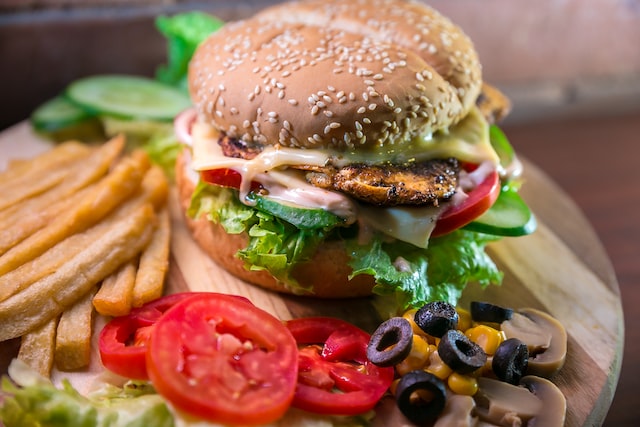
Stress Less, Eat Less: Simple Strategies to De-Stress and Tame Cravings for Good
Picture this: you get home after a stressful day and find yourself making a beeline to the pantry. You feel ...
Picture this: you get home after a stressful day and find yourself making a beeline to the pantry. You feel too overwhelmed and exhausted to cook yourself a nourishing meal so you grab the convenient comfort food items you have lying around. Your cravings feel out of control and you find yourself eating to the point of discomfort – on foods that you know are not ideal in reaching your health goals.
Does this sound like you?
Stress eating is a common struggle that many people face. Studies have shown that stressful events activate systems in our body associated with metabolism, cognition, and reward. When our bodies are stressed, we release the steroid hormone, cortisol, in response to stress. Long durations of heightened cortisol levels can lead to increased cravings and food consumption.
Harvard Health reports that physical and emotional distress are linked to an increased intake of food with high fat and sugar content. These “comfort” foods seem to counteract stress – which intensifies stress-induced cravings for these less nutritious foods. Stress also impacts sleep quality as well as exercise behaviors, which in turn, impacts our weight.

What ways can you de-stress to prevent these cravings once and for all? Read through these 8 tips:
- Practice mindful eating
Mindfulness helps you become more aware of your food choices, cravings, and impulses. Mindful eating can lead to you becoming more in tune with your body to help you better recognize whether your urge to eat is due to true hunger or another emotion like boredom or stress.
- Change your environment
Oftentimes, we associate certain environments with certain things. If you find that whenever you get home from work you head to the kitchen pantry for “comfort” foods, try switching up your environment. If you often leave work feeling stressed, go somewhere other than your kitchen after your day ends. You could go for a walk in a park or sit on the couch and call someone.
- Find hobbies that alleviate stress
If eating is your sole solution to falsely cope with feelings of stress, try to replace eating with hobbies that don’t involve food. You could try different types of exercise, start a DIY project, or walk around your neighborhood. This way, the next time you are feeling stressed, you’ll already have activities planned to aid as stress relievers instead of eating on autopilot.
- Find healthier alternatives when cravings arise
Of course, cravings are completely normal! If you are hungry and want to eat something, try replacing processed foods high in fat and sugar content with healthier alternatives. For example, if you want something sweet you could try having an apple with nut butter and some granola. This combination of carbohydrates, healthy fats, and fiber will help keep you full for longer than a processed snack with empty calories.
- Be mindful of the food you have on hand
If you always have foods like processed snacks, sugary desserts, and fast food leftovers sitting around at your home, you’ll have a harder time resisting your cravings when they arise. While all foods can fit, having these foods on hand will only fuel your cravings and overeating habits, which makes it harder to reach your health goals.
- Be aware of your portion sizes
Instead of eating food out of the box or container, put a snack sized portion on a plate. If you tend to eat straight out of the bag, it is way easier to eat past fullness and forgo your fullness cues.
- Reach out for social support
Stress is a feeling that all of us deal with daily and to varying degrees. Having family members and friends to converse with and rely on for support can help offset stress. Engaging in social activities also serves as a positive distraction when cravings arise.
- Understand your stress triggers
Pay attention to what makes you feel particularly stressed. Is it due to certain situations? Certain emotions? Certain times of the day? When you become more aware of your triggers, you can plan healthier coping strategies.
If stress eating is something you struggle with, you’re not alone. The key is to find ways to relieve your stress that don’t involve overeating. No matter where you are on your health journey, it is possible to manage your stress and feel better in your body. By implementing these tips, you can finally become your healthiest and best version of yourself.

Hi lady! I’m a registered dietitian and metabolism expert with over 7 years experience helping women fix their metabolism, feel more confident in their body, and feel better than ever. I’ve worked with 100s of women to help them to make reaching their nutrition goals doable and simple using my unique 3-phased approach that focuses on mindset, mindfulness, and metabolism.
You can learn more about my high-touch, personalized coaching program and how it can change your life forever here.
Are you tired of endless diets and gimmicks that promise quick results but fail to deliver? If you’re ready to embrace a sustainable approach to weight loss, one that doesn’t involve restrictive eating or relying on magic weight loss pills, then look no further.
Watch my program video here where you’ll discover the secrets to shedding pounds for good while nourishing your body and mind.
This program is for you if you’re ready to say goodbye to the cycle of temporary fixes and hello to a lifetime of feeling and looking your absolute best. It’s time to take control of your health and well-being.
Take control of your health and weight loss goals now.
** This article was written by Ava Stover, nutrition intern. Fact checked by Allison Tallman RD.


